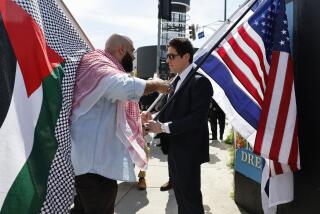Lebanon gears up for general elections
Along narrow streets and terraced mountain roads, tens of thousands of Lebanese troops have spread out. At Beirut’s airport, Lebanese who live abroad continue to flood in, eager to vote in Sunday’s general elections.
And from around the world, an alphabet soup of voting rights groups have begun to place themselves at polling booths to monitor the balloting that could change the balance of power in this tiny, religiously diverse and volatile Middle East country. The ramifications would extend far beyond its borders if the coalition led by the Shiite Muslim militia Hezbollah wins a majority of seats, as widely expected.
“Lebanon is a composition of minorities, and . . . each minority is sponsored by a world player, and these are the main players in the Middle East,” said Charles Harb, a professor of political science at American University of Beirut. “We’re talking about the U.S., Saudi Arabia, Syria, Iran, France. There’s a lot at stake here.”
Regardless of the country’s internal politics, the world will regard even a narrow win by the coalition of Shiite Muslim, Christian, leftist and pro-Syrian groups -- named March 8 -- over the pro-U.S. March 14 alliance as a victory for Hezbollah’s ideology and its Iranian and Syrian backers. That would strain Lebanon’s ties with Washington as well as pro-U.S. Arab nations such as Saudi Arabia, Egypt and Jordan.
Vice President Joe Biden hinted in a visit to Lebanon last month that U.S. military aid could be scaled back if Hezbollah and its allies win. Iranian Foreign Minister Manouchehr Mottaki said Monday that if Hezbollah’s allies proved victorious, Iran “would take away the lesson that the people of Lebanon support the resistance” to Israel and the United States.
But some people are sounding cautionary notes. They say Hezbollah will owe any win to its alliance with Christian leader Gen. Michel Aoun, whose constituents were staunchly opposed to Syrian and Iranian influence in Lebanon until he switched sides four years ago.
“To portray an opposition electoral victory as a major setback for American policy and a victory for the terrorist Hezbollah organization and its terrorist-supporting Iranian backers . . . is very unhelpful,” said Graeme Bannerman, a researcher at the Middle East Institute in Washington, who will serve in Lebanon as an election observer. “Hezbollah will have fewer seats in the parliament than [hard-line Israeli hawk Avignor] Lieberman has in the Knesset.”
Within Lebanon’s complicated political patchwork, identity rather than ideology often drives alignments, with each group supporting its leader in an attempt to hold on to influence and power.
“A big part of the political race is about a struggle between individuals for influence and power that is sometimes tied to old-time feuds between political families,” said Karam Karam, political analyst at the Lebanese Center for Policy Studies.
Many Lebanese are also fed up with what they view as the corruption and ineptitude of the U.S.-backed government of Prime Minister Fouad Siniora, and the opposition’s simple calls for “change” has struck a chord with key segments of the sharply divided Christian community, as well as among Shiites who were for decades shut out of power.
“The most important issue is the economy, because right now we are at zero,” said Amin Sleibeh, a 65-year-old taxi driver. “Gas is expensive, everything is expensive, and it’s a shame because Lebanon is the most beautiful country in the world, but no one cares about the people -- everyone just wants their share.”
Democracy advocates and electoral observers flooding the country argue that a peaceful transition will herald a democratic milestone for Lebanon, which has struggled for decades with civil war and foreign encroachment.
“Having a change of guard creates an atmosphere of democratic competition that is healthy,” said Elias Muhanna, a Harvard researcher who writes about Lebanese politics on his blog, Qifa Nabki.
Some believe a Hezbollah win could also temper the group’s rhetoric and actions.
“Up until now their platform has consisted of rejecting everything March 14 does, but if they win then the burden of responsibility will rest on their shoulders,” said Amal Saad-Ghorayeb, a Lebanese researcher and writer.
The outcome of the election will hinge on about half a dozen electoral districts where Aoun’s Free Patriotic Movement is vying against supporters of Christian leaders Samir Geagea or Amine Gemayel for the 128-seat parliament.
“The Christians are the swing voters in these elections,” Saad-Ghorayeb said. “The Christian community is more divided, and the Christian vote will count more in these elections.”
Sentiment in several key Christian districts has swung heavily toward Aoun in the last year, said pollster Rabia Habr, who accurately predicted the results of 127 seats in 2005.
Another poll conducted by Information International predicted that Hezbollah and Aoun would gain a four-seat edge in the elections.
Regardless of the outcome, political analysts foresee a reshuffling of alliances. Druze leader Walid Jumblatt, thus far in the pro-U.S. camp, could easily jump ship, experts say. A few dangle the possibility that Aoun and Hezbollah could also have a falling-out.
--
Lutz is a special correspondent.
Special correspondent Raed Rafei in Beirut contributed to this report.
More to Read
Start your day right
Sign up for Essential California for news, features and recommendations from the L.A. Times and beyond in your inbox six days a week.
You may occasionally receive promotional content from the Los Angeles Times.






